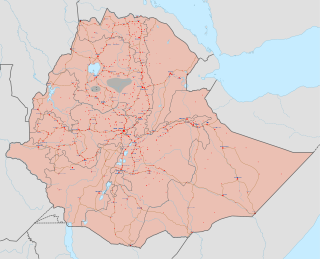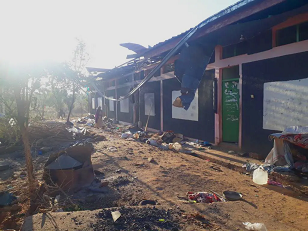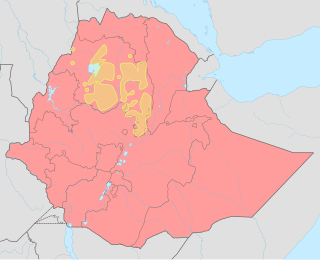
Abiy Ahmed Ali is an Ethiopian politician who is the current Prime Minister of Ethiopia since 2018 and the leader of the Prosperity Party since 2019. He was awarded the 2019 Nobel Peace Prize "for his efforts to achieve peace and international cooperation, and in particular for his decisive initiative to resolve the border conflict with neighbouring Eritrea". Abiy served as the third chairman of the Ethiopian People's Revolutionary Democratic Front (EPRDF) that governed Ethiopia for 28 years and the first person of Oromo descent to hold that position. Abiy is a member of the Ethiopian parliament, and was a member of the Oromo Democratic Party (ODP), one of the then four coalition parties of the EPRDF, until its rule ceased in 2019 and he formed his own party, the Prosperity Party.

The 2021 Ethiopian general election to elect members of the House of Peoples' Representatives was held on 21 June 2021 and 30 September 2021. Regional elections were also held on those dates.

The Tigray war was an armed conflict that lasted from 3 November 2020 to 3 November 2022. It was a civil war that was primarily fought in the Tigray Region of Ethiopia between forces allied to the Ethiopian federal government and Eritrea on one side, and the Tigray People's Liberation Front (TPLF) on the other.
This timeline of the Tigray War is part of a chronology of the military engagements of the Tigray War, a civil war that began in the Tigray Region of Ethiopia in early November 2020.

Fano is an ethno-nationalist Amhara militia and former protest movement. It has engaged in violent clashes throughout Ethiopia in the name of neutralizing perceived threats to the Amhara people. Fano has absorbed many units and personnel of the Amhara Regional Special Forces that did not integrate into the Ethiopian National Defense Force (ENDF). Fano militias have been involved in armed conflicts with the Tigray People's Liberation Front (TPLF), the Oromo Liberation Army (OLA), and the ENDF. They have also clashed with the Sudanese Armed Forces (SAF) on the border of Ethiopia and Sudan.
Awol Kasim Allo is an Ethiopian academic, author and lecturer who started teaching law at University of Keele in 2016.

The ongoing Ethiopian civil conflict began with the 2018 dissolution of the Ethiopian People's Revolutionary Democratic Front (ERPDF), an ethnic federalist, dominant party political coalition. After the 20-year border conflict between Ethiopia and Eritrea, a decade of internal tensions, two years of protests, and a state of emergency, Hailemariam Desalegn resigned on 15 February 2018 as prime minister and EPRDF chairman, and there were hopes of peace under his successor Abiy Ahmed. However, war broke out in the Tigray Region, with resurgent regional and ethnic factional attacks throughout Ethiopia. The civil wars caused substantial human rights violations, war crimes, and extrajudicial killings.

Temesgen Tiruneh is an Ethiopian politician who is serving as the current Deputy Prime Minister of Ethiopia since 8 February 2024. He previously served as the director general of National Intelligence and Security Service of Ethiopia since 2020

The TDF–OLA joint offensive was a rebel offensive in the Tigray War and the OLA insurgency starting in late October 2021 launched by a joint rebel coalition of the Tigray Defense Forces (TDF) and Oromo Liberation Army (OLA) against the Ethiopian National Defense Forces (ENDF) and government. The TDF and OLA took control of several towns south of the Amhara Region in the direction of the Ethiopian capital Addis Ababa in late October and early November. Claims of war crimes included that of the TDF extrajudicially executing 100 youths in Kombolcha, according to deral authorities.
This Timeline of the Tigray War is part of a chronology of the military engagements of the Tigray War, a civil war that began in the Tigray Region of Ethiopia in early November 2020.

In the late hours of 7 January 2022, the Ethiopian Air Force (ETAF) carried out an airstrike on a camp for internally displaced persons (IDP) set up in Dedebit Elementary School, located in the Tigray Region of Ethiopia. Between 56 and 59 people were killed in the attack, and at least 30 others were left injured.
The 1995 Ethiopian Federal Constitution formalizes an ethnic federalism law aimed at undermining long-standing ethnic imperial rule, reducing ethnic tensions, promoting regional autonomy, and upholding unqualified rights to self-determination and secession in a state with more than 80 different ethnic groups. But the constitution is divisive, both among Ethiopian nationalists who believe it undermines centralized authority and fuels interethnic conflict, and among ethnic federalists who fear that the development of its vague components could lead to authoritarian centralization or even the maintenance of minority ethnic hegemony. Parliamentary elections since 1995 have taken place every five years since enactment. All but one of these have resulted in government by members of the Ethiopian People's Revolutionary Democratic Front (EPRDF) political coalition, under three prime ministers. The EPRDF was under the effective control of the Tigray People's Liberation Front (TPLF), which represents a small ethnic minority. In 2019 the EPRDF, under Abiy, was dissolved and he inaugurated the pan-ethnic Prosperity Party which won the 2021 Ethiopian Election, returning him as prime minister. But both political entities were different kinds of responses to the ongoing tension between constitutional ethnic federalism and the Ethiopian state's authority. Over the same period, and all administrations, a range of major conflicts with ethnic roots have occurred or continued, and the press and availability of information have been controlled. There has also been dramatic economic growth and liberalization, which has itself been attributed to, and used to justify, authoritarian state policy.
Democratic backsliding in Ethiopia is ongoing, most notably under the administration of Prime Minister Abiy Ahmed. Since he assumed power in April 2018, Ahmed has played a crucial role in reforms in Ethiopian politics and the reversal of policies implemented by the former ruling party, the Ethiopian People's Revolutionary Democratic Front (EPRDF). Abiy immediately gained public approval and international recognition owing to liberalized policymaking, including in media outlets, gender equality, internet freedom, and privatization of the economy. Further, he was also warmly praised for ending the 20-year conflict between Ethiopia and Eritrea, for which he was awarded the 2019 Nobel Peace Prize—being the first Ethiopian to earn the title. In 2019, Ethiopia received a score of 19 out of 100 in the Freedom in the World metric, a significant improvement from previous years, although it is still characterized as "Not Free". In December 2019, he formed the Prosperity Party by the dissolution of EPRDF and merged all its ethnic-based regional parties while the Tigray People's Liberation Front (TPLF) refused to obey, resulting intense face-off with the federal government. He promised to hold a free and fair upcoming election; however, due to the COVID-19 pandemic, deterioration, and other security and logistics issues, the election was postponed indefinitely in mid-2020. Opponents called this action a backdrop to "reconsolidate dictatorship" and "constitutional crisis". On 9 September 2020, the Tigray Regional election was held in what the federal government deemed an illegal election. According to the electoral commission, the TPLF won 98.2% of the 152 seats that were contested. The federal government and the Tigray authority's relations were aggravated by late 2020, culminating in the Tigray War.
Events in the year 2023 in Ethiopia.

The War in Amhara is an armed conflict and insurgency in the Amhara Region of Ethiopia that began in April 2023 between the Fano militia and the Ethiopian government. The conflict started after the government attempted to dissolve the Amhara Special Forces and other regional forces as part of a plan to reform and centralize the country's security apparatus, and integrate them into the federal armed forces. This move led to protests and armed resistance by local forces under Fano.
Political repression is a visible scenario under the leadership of Prime Minister Abiy Ahmed after 2018, characterized by severe human rights violation, restriction of press, speeches, dissents, activism and journalism that are critical to his government. Similar to TPLF-led EPRDF regime, there was a raise of censorship in the country, particularly internet shutdowns under the context of anti-terror legislation labelling them "disinformation and war narratives" since the raise of armed conflict in Ethiopia. In June 2018, Abiy unblocked 64 internet access that include blogs and news outlets.
The OLA peace process is a set of negotiations, agreements and actions to end the insurgency of the Oromo Liberation Army (OLA), which split from its wing, the Oromo Liberation Front (OLA) and rebels against the Ethiopian federal government since 2018. The Oromia region has experienced prolong conflict and instabilities first initiated by OLF with successive Ethiopian government since 1973.
The Merawi massacre was the extrajudicial killing and massacre of 50 to 100 residents in the town of Merawi in the Amhara Region, Ethiopia by the Ethiopian National Defense Force (ENDF), between 29–30 January 2024. The massacre occurred after an attack on an Ethiopian military garrison by the Fano militia. Four survivors attributed the motivation for the massacre as revenge for the Fano attack. An investigation was launched by the Ethiopian Human Rights Commission (EHRC).
The Gida Kiremu massacres refers to a series of attacks between 18 and 20 August 2021 when the Oromo Liberation Army (OLA) targeted Amhara civilians in Gida Kiremu, Oromia Region, Ethiopia, killing over 210. The attack on 18 August killed 150 Amhara civilians, and reprisal attacks by Amhara militias killed 60 mostly-Oromo civilians the day after.
Christian Tadele is an Ethiopian politician who is a member of the House of Peoples' Representatives (HoPR) in Opposition group, Chair Person of the Opposition Cocos and Chairman of the Standing Committee on Government Expenditure. He was the spokesperson and Political Affairs Chief of the Amhara nationalist party National Movement of Amhara (NaMa) from 2018.









